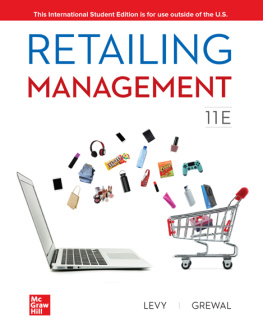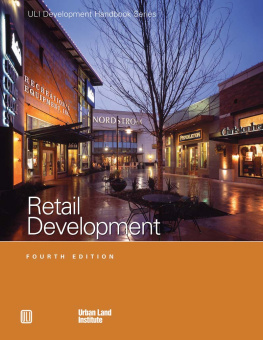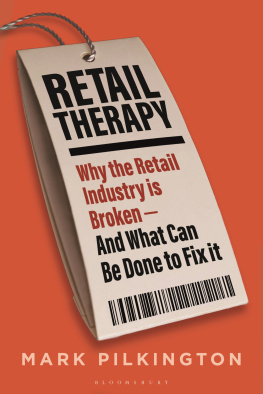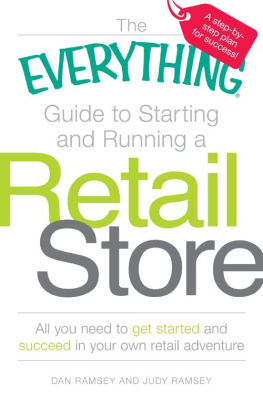THE EMERGENCE OF MODERN RETAILING, 17501950
Books of related interest
Banks, Networks and Small Firm Finance
edited by Andrew Godley and Duncan M. Ross
Nordic Business in the Long View
On Control and Strategy in Structural Change
edited by Kersti Ullenhag
Organisational Capability and Competitive Advantage
edited by Charles Harvey and Geoffrey Jones
Labour and Business in Modern Britain
edited by Charles Harvey and John Turner
Business History
Concepts and Measurement
edited by Charles Harvey
International Competition and Industrial Change
edited by Charles Harvey and Jon Press
International Competition and Strategic Response in the Textile Industries since 1870
edited by Mary B. Rose
Banks and Money
International and Comparative Finance in History
edited by Geoffrey Jones
Capital, Entrepreneurs and Profits
edited by R.RT. Davenport-Hines
The Emergence of Modern Retailing, 17501950
edited by
NICHOLAS ALEXANDER and GARY AKEHURST
First published in 1999 in Great Britain by
FRANK CASS AND COMPANY LIMITED
Newbury House, 900 Eastern Avenue
London IG2 7HH, England
and in the United States of America by
FRANK CASS
c/o International Specialized Book Services, Inc.
5804 N.E. Hassalo Street, Portland, Oregon 972133644
Copyright 1999 Frank Cass & Co. Ltd
British Library Cataloguing in Publication Data
The emergence of modem retailing, 17501950
1. Retail trade
I. Alexander, Nicholas, 1960 II. Akehurst, Gary 381.1
ISBN 0 7146 4922 8 (hbk)
ISBN 0 7146 4481 1 (pbk)
Library of Congress Cataloging-in-Publication Data
The emergence of modem retailing, 1750-1950 / edited by
Nicholas Alexander and Gary Akehurst
p. cm.
Includes index.
ISBN 0-7146-4922-8 (hardcover). ISBN 0-7146-44811 (pbk)
1. Retail trade History. 2. Retail trade Great Britain History.
I. Alexander, Nicholas, 1960 II. Akehurst, Gary, 1951
HF5429.E455 1998
This group of studies first appeared in a Special Issue of Business History
(ISSN 0007-6791), Vol.40, No.4 (October 1998),
[The Emergence of Modem Retailing, 17501950]
All rights reserved. No part of this publication may be reproduced, stored in a retrieval system, or transmitted in any form, or by any means, electronic, mechanical, photocopying, recording or otherwise without the prior written permission of Frank Cass and Company Limited.
Introduction: The Emergence of Modem Retailing, 17501950
Nicholas Alexander and Gary Akehurst
Bournemouth University
Portsmouth University
This collection of essays is devoted to the history of retailing. There are three primary motivations which lie behind this publication. First, it is recognised that retailing has received limited attention within the discipline of history. Secondly, where retailing has become an area considered worthy of academic study, notably within management studies, the historical dimension has been under-valued and under-explored. Thirdly, studies in retail history must draw on both historical and management traditions if valuable research is to be undertaken.
This publication is, therefore, intended both as an opportunity to bring together academics working on retail business history from backgrounds in history, historical-geography and management, and to indicate that there is a rich vein of research to be explored in this subject area. The essays included in this publication are examples of the work that has been done and examples of the issues which deserve consideration in the context of this important area of business, economic and social activity.
That history, as a discipline, has ignored retailing would be something of an exaggeration, but it would certainly be correct to acknowledge that retail history has been something of a poor relation within the study of business history, which itself has had to assert its right to be seated at historys high table. While business history journals, such as the Business History Review and Business History, have published in the area of retail history, they also illustrate the relative paucity of activity in the area of retailing. While manufacturing industry and other service sectors have attracted interest, retail history articles are few and far between in these journals. Indeed, when articles on distribution and trade-related issues are excluded, the number of articles on retailing per se are very few. While it may not be surprising to find the service sector generally underrepresented (it has also received insufficient attention within management studies), it is a little more surprising to see research interest in retailing lagging behind areas such as financial services. Indeed, it is particularly instructive to place the development, or lack of development, of retail business history against the development of financial services history; where, as Pearson has pointed out, the emergence of the Financial History Review in recent years is illustrative of the increased interest in that area of the service economy which contrasts clearly with the experience of distribution and retailing.1 Likewise, Godley and Rosss recent special issue of Business History,2 and Joness recent work on multinational banking,3 points toward a growing literature and academic interest in this area. The service sector is clearly not out of bounds, but retailing has clearly shown itself to be a slow developer. Consideration of articles in Business History since 1958 shows that, while important work has appeared, it has not been part of what might be considered a sustained effort to explore the retail business history dimension. Articles by Blackman, Scott, Hopkins, Mui and Mui, Porter, Redlich, Rubin, and Shaw illustrate the work which has addressed retail issues directly or comparatively,4 and other articles, such as those by Dixon, Green, Harvey and Press, Jones, Sutton, and Weatherill,5 shed light on retail history through the primary consideration of other issues. While the subject matter of these articles is informative, they have neither created a focused debate, nor scrutinised particular issues beyond, arguably, the emergence of modern retail systems during the nineteenth century. Indeed, the lack of historical consideration has become self-perpetuating. As Christine Shaw has noted with reference to the Dictionary of Business Biography,6 a consequence of business historys neglect of retailing has been such that, at the time of the dictionarys compilation, it was both difficult to identify retailers who should be included in the dictionary and to compile biographies with suitable depth.
The comparative failure of business history to embrace retailing as a subject worthy of consideration is somewhat mirrored by retail managements failure to embrace historical method and recognise the worth of historical issues when considering management subjects. This failure, which has been explored and lamented within retail studies journals in recent years on both sides of the Atlantic,7 remains a serious impediment to the development of an understanding of retail change. Retail management studies has emerged as a vital area of academic development in the last two decades, but it has tended to ignore the historical dimension. In the UK, the subject area has come into being through the synthesis of geographical and marketing academic research and has been formalised into an area of teaching through the needs of the commercial sector. Since the mid-1980s, universities in the UK have developed courses in retail management which have drawn heavily on the research carried out by geographers and marketers in the 1960s, 1970s and 1980s and have been strongly influenced by the cognitive structures borrowed from marketing and retail academics in the US.8










